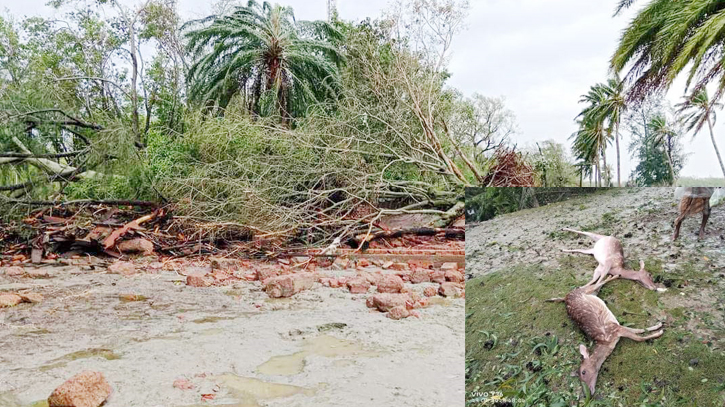
Photo: Messenger
The pressure of severe damage is falling on nature as the capacity of the people of Bangladesh to deal with natural disasters has decreased. This harsh reality has emerged through the onslaught of Cyclone Remal. As the devastating cyclone swept over the country's coastal districts on Sunday, concerned authorities fear major damage to the Sundarbans and its wildlife.
Due to the high tides, embankments were breached, inundating vast coastal areas. The world heritage site Sundarbans was submerged under nearly 15 feet of water due to the surge, causing extensive damage to biodiversity.
Additionally, many fish enclosures along the coast have been washed away, and saline water has entered the low-lying inundated coastal areas. Government officials believe that the prolonged onslaught of Remal has caused devastation similar to that of Cyclone Aila 15 years ago in Bangladesh.
Experts say that due to climate change, especially global warming, people are now facing natural disasters more frequently than ever before. Intense heat waves, droughts, and wildfires are increasing, along with heavy rainfall, floods, and cyclones. Island nations like Bangladesh are being severely impacted, with devastating effects on nature. Bangladesh has once again witnessed the horrific onslaught of a cyclone.
As time passes, the devastating impact of Remal is becoming clearer. During its 36-hour stay in Bangladesh, it claimed 21 lives. Thirty dead deer have been recovered from the Sundarbans. The damage to the biodiversity of the Sundarbans is still incalculable. Additionally, there has been extensive damage to agriculture across the country, with paddy, vegetables, betel leaves, fish, and fish enclosures being washed away. Bangladesh is facing losses worth hundreds of crores of taka.
30 deer were found dead in the Sundarbans: Thirty deer were found dead at Katka Jamtala in the Sundarbans on Tuesday, while forest officials also rescued 13 deer alive after the 8-10 feet high tidal surges under the influence of the cyclone flooded some parts of the world's largest mangrove forest.
The violent storm destroyed a number of trees and inundated vast parts of the Sundarbans, destroying the abode of the wild animals, according to forest officials.
Salt water entered 80 ponds inside the forest, destroying the source of fresh water.
Forest officials are working to assess the damage to the forest resources and wildlife caused by the cyclone.
Mihir Kumar Doe, the divisional forest conservator of the Khulna region, said the Sundarbans witnessed an 8-10 feet high tidal surge on Sunday and Monday, resulting in the inundation of vast tracts of the Sundarbans including Katka, Kachikhali, Dubla, Shela, Nilkamal, Mandarbari, and some other parts.
Forest officials buried the carcasses of 30 deer inside the forest.
Kazi Muhammad Nurul Karim, divisional forest officer of the Sundarbans East zone, said a number of baby deer died due to the tidal surge and the death toll is likely to rise further.
Meanwhile, different infrastructures of the forest department were damaged due to the cyclone.
Damage to fisheries and livestock worth 701.41 crore taka: Cyclone Remal caused extensive damage in 19 districts of the country. Among these, the cyclone caused a total loss of 701.41 crore taka in the fisheries and livestock sectors. According to the Department of Fisheries, the fisheries sector alone suffered a loss of around 700 crore taka due to Remal's impact. Around 41,000 fish enclosures, 26,300 ponds, and 4,000 crab enclosures were damaged in 13 coastal districts. On the other hand, the Department of Livestock Services reported that the livestock sector incurred a loss of around 1.41 crore taka due to Remal. Around 50 cattle and 30 poultry farms were damaged in 8 coastal districts, resulting in the loss of many goats, sheep, and poultry. Both departments mentioned that the extent of the damage was assessed based on data collected until Tuesday (May 28).
Damage of 245.95 crore taka to fisheries in Khulna: In Khulna, the storm surge and tidal waves caused by Cyclone Remal breached embankments, inundating residential areas. Additionally, 3,600 ponds and 9,115 fish enclosures were washed away, resulting in a loss of 245.95 crore taka to the fisheries sector. This information was provided on Tuesday afternoon by Joydev Pal, the District Fisheries Officer of Khulna. Similar damage has occurred in other districts across the country, the extent of which is yet to be determined.
Messenger/Disha








